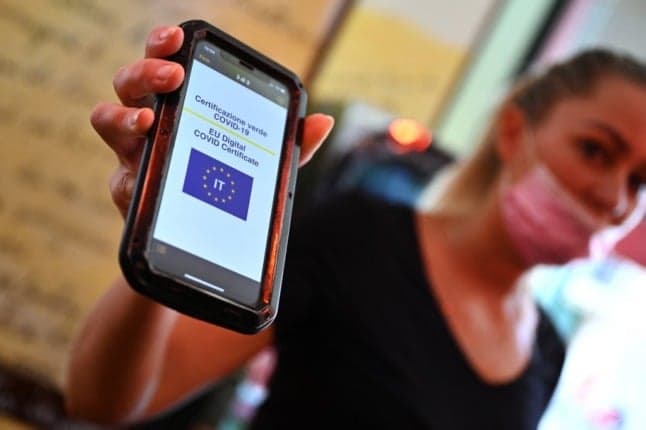How the rules of the EU Covid certificate for travel will change from February

As infection rates surge in parts of Europe, the EU will limit the validity of its flagship Covid-19 certificate to nine months. The pass is designed to allow for restriction free travel within the bloc but certain countries are stepping up restrictions.
Since it was rolled out in July the EU's Covid certificate has allowed for those vaccinated, recovered or who tested negative for Covid, to travel freely within the bloc without the need for subsequent tests or quarantine.
However with cases now surging across the EU and the consensus between member states fractured as certain countries impose new travel restrictions, the European Commission has adopted new rules on the validity of the Covid-19 travel pass.
The Commission on Tuesday adopted rules that will make the certificate valid for just nine months after the holder became fully vaccinated, Reuters reported.
That means after two shots of a two dose vaccine such as Pfizer or Moderna or after one shot of the Johnson & Johnson vacccine.
After a booster shot, the validity of the COVID-19 pass will be extended further without a set limit.
The new rule could still be blocked by a qualified majority of EU governments or a simple majority of European Parliament members, but Reuters reports that officials have said there is sufficient support for it.
If passed, the new rules will be binding on the 27 EU states from Feb 1st.
Once the rule is in place in February, EU member states will be obliged to let fully vaccinated travellers with a valid pass enter the country. However individual countries could still impose further requirements, such as negative tests or quarantines, as long as they are proportionate.
Seven EU states are currently requiring fully vaccinated travellers from other EU countries to also show a negative test upon arrival, measures some see as damaging the credibility of the EU pass, Reuters reports.
Those countries are Italy, Greece, Ireland, Portugal, Latvia, Cyprus and Austria.
Under the harmonised system the Covid certificates, which can be on paper or stored electronically on smartphones – carry proof via a QR code that the holder has either:
- been vaccinated against Covid-19
- recently recovered from the virus (meaning the holder has antibodies in their system)
- recently tested negative for Covid
But a time limit for their use was never set and with studies revealing that immunity via vaccination wears off after six or seven months there has been increased pressure to add a duration length to the certificates as well as include mention of booster shots.
Given that borders are national competence not an EU one member states have always been allowed to introduce their own Covid entry rules and restrictions.
Separate to the harmonised EU travel agreement many member states such as France and Italy have made vaccine passes compulsory for entry into leisure venues such as bars and restaurants.
Comments (3)
See Also
Since it was rolled out in July the EU's Covid certificate has allowed for those vaccinated, recovered or who tested negative for Covid, to travel freely within the bloc without the need for subsequent tests or quarantine.
However with cases now surging across the EU and the consensus between member states fractured as certain countries impose new travel restrictions, the European Commission has adopted new rules on the validity of the Covid-19 travel pass.
The Commission on Tuesday adopted rules that will make the certificate valid for just nine months after the holder became fully vaccinated, Reuters reported.
That means after two shots of a two dose vaccine such as Pfizer or Moderna or after one shot of the Johnson & Johnson vacccine.
After a booster shot, the validity of the COVID-19 pass will be extended further without a set limit.
The new rule could still be blocked by a qualified majority of EU governments or a simple majority of European Parliament members, but Reuters reports that officials have said there is sufficient support for it.
If passed, the new rules will be binding on the 27 EU states from Feb 1st.
Seven EU states are currently requiring fully vaccinated travellers from other EU countries to also show a negative test upon arrival, measures some see as damaging the credibility of the EU pass, Reuters reports.
Those countries are Italy, Greece, Ireland, Portugal, Latvia, Cyprus and Austria.
- been vaccinated against Covid-19
- recently recovered from the virus (meaning the holder has antibodies in their system)
- recently tested negative for Covid
Join the conversation in our comments section below. Share your own views and experience and if you have a question or suggestion for our journalists then email us at [email protected].
Please keep comments civil, constructive and on topic – and make sure to read our terms of use before getting involved.
Please log in here to leave a comment.